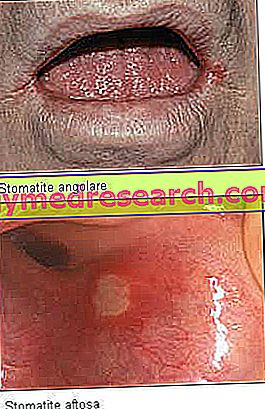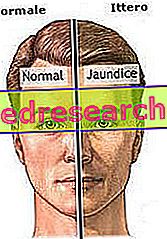What is Stomatitis?
Stomatitis is an inflammatory process that affects the oral mucosa; the causes can be multiple: mechanical, chemical, inflammatory, bacterial, mycotic, viral or consequent to systemic diseases (metabolic, autoimmune, etc.). These factors favor infections of the oral cavity, which tends to become inflamed and generate the typical stomatitis-related disorders.

Diagnosis
Evaluation of clinical signs and diagnosis of stomatitis
The diagnosis of stomatitis is based fundamentally on the analysis of clinical symptoms and on the patient's clinical history (anamnesis). The person suffering from stomatitis usually complains of a burning sensation and a marked sensitivity to temperature (hot food or drinks) and irritating foods.
The patient suffering from stomatitis should consult his doctor and / or dentist in order to first identify the primitive causes of inflammation, and then remedy it by avoiding the consequent secondary disorders associated with the manifestation or its chronicization. In fact, with the inspection of the oral cavity it is possible to exclude diseases due to local causes, such as lesions caused by hooks of mobile devices or dental prostheses with inadequate edges.
The diagnosis of stomatitis should ascertain:
- the duration of symptoms and the onset of these in previous clinical episodes
- the presence of pain and its degree (related to mild or more severe stomatitis)
- the relationship of symptoms with food taken to drugs or occupational exposure (chemicals, metals, fumes or dust).
The anamnesis (the patient's medical history) must ascertain the known conditions that may have caused lesions of the oral cavity (for example, the presence of a herpes simplex infection) and the risk factors for such alterations (cancer, diabetes, use of immunosuppressants, HIV infections ...).
The doctor during the diagnosis of stomatitis must record the use of the drugs taken by the patient in recent times, as well as ascertaining whether the patient has been subjected to radiotherapy or chemotherapy therapies.
The patient should also make known the consumption of tobacco and indicate any unprotected sexual relations (in particular the practice of oral relationships).
The patient's physical examination must include:
- inspection of the oral cavity to determine the nature of any lesions and to establish their position, with examination and palpation of the lips, tongue, cheeks, hard and soft palate, as well as the cervical and submandibular lymph nodes;
- the control of other mucous surfaces, including the genitals, to detect erythema, edema, rash / health-well-being / skin rash.html, desquamation or other lesions;
- evaluation of the general state of the patient: fever, malaise and other significant signs related to a systemic disease.
The physical examination must also look for possible causes on a systemic level. For example: chronic diarrhea and weakness (inflammatory bowel disease, celiac disease, other malabsorption syndromes), genital lesions (BehÒ «et, syphilis syndrome), eye irritation (BehÒ« et et Syndrome), and weight loss, in addition to general malaise and fever.
During the clinical examination it is necessary to pay particular attention in the search for the following results, indicative of a stomatitis with systemic interest: fever, blisters, ocular inflammation and impaired immune system. Such stomatitis, often caused by an "extra-oral" cause, requires immediate intervention that involves the adoption of specific treatments.
Diagnostic tests and interpretation
In addition to the clinical examination, the patient can undergo possible diagnostic tests that allow the identification of characteristic signs of stomatitis or any risk factors. Usually, these investigations are not performed routinely. These tests are recommended especially if the disease becomes chronic and / or systemic and include some analyzes including:
- Microbiological analysis by culture, in case of recurrent stomatitis
- Determination of serum iron, ferritin, vitamin B12, folic acid, zinc
- Search for anti-endomysium antibodies for the diagnosis of celiac disease
- Biopsy of the lesion for persistent lesions that do not have an evident etiology (cause)
More details and specifications are the following laboratory tests:
- Tzanck test (microscopic examination of the smear of material taken from the bottom of a vesicle, which makes it possible to distinguish diseases such as chicken pox, herpes simplex, herpes zoster or pemphigus)
- Herpes simplex virus culture
- Serological test for syphilis
- Immunofluorescence to distinguish recurrent aphthous stomatitis from bullous skin disorders
The results of diagnostic tests involving biopsy and / or analysis of chronic suspicious lesions allow the detection of possible hematologic diseases, vasculitis or oral carcinoma.
Treatment
Before starting a therapy, it should be remembered that it is essential to identify the specific cause that caused the onset of stomatitis. The treatment of stomatitis depends on the type, symptomatology and set of factors at the origin of the disorder.
Stomatitis is generally treated with over-the-counter medications that help alleviate the symptoms associated with the condition:
- antiseptic drugs, useful for disinfecting the oral cavity;
- antibiotics, antifungals or antivirals, in case of infection, on the advice of a doctor;
- anesthetics and painkillers, to relieve the sensation of pain related to the presence of the lesion.
At a general level, the treatment of stomatitis is directed to the specific cause, while locally it includes applications of corticosteroid drugs (therefore on the lesion that causes pain) assisted by the use of antiseptic mouthwashes.
Some types of mouthwash are particularly suitable for the treatment of stomatitis, thanks to the presence of active ingredients and specific ingredients effective in the treatment of signs developed following the onset of stomatitis. These active components are:
- dexamethasone: corticocosteroid able to alleviate the typical symptoms of inflammation (swelling, pain, heat)
- tetracycline: antibacterial inhibitor of protein synthesis (especially indicated in case of canker sores)
- nystatin: antibiotic inhibitor of the cytoplasmic membrane functions, binds to the membrane of the pathogen and induces its neutralization
- diphenhydramine: antihistamine and local anesthetic
Mouthwashes containing these active ingredients are usually subject to medical prescription, but they are an effective remedy for the treatment of stomatitis.
Other treatments destined for the local level involve the use of:
- Anesthetics: sucralfate, lidocaine
- Protective or barrier medicaments
- Anti-inflammatory drugs: dexamethasone, triamcinolone, amlexanox
- Physical or chemical cauterization
In the case of stomatitis it is useful to adopt some precautions early:
- If identified, all substances that cause stomatitis (including drugs and / or particular foods to which the subject has developed allergies or intolerances) should be avoided.
- Meticulous oral hygiene can help prevent a secondary infection.
- Suspend (or eliminate) the use of alcohol, coffee and tobacco.
Natural remedies
Some medicinal plants and herbal remedies can contribute effectively to the treatment of stomatitis:
| Description | Main activity |
Calendula | Anti-inflammatory and cicatrizant |
Currant | Anti-inflammatory action |
C vitamin | Immunostimulant and antioxidant: accelerates the healing of oral ulcers |
Rosehip | Contains vitamin C in high concentration |
Lemon | Disinfectant property and contains vitamin C |
Propolis | Antiseptic property |
Adopting an adequate diet can help maintain good health: the daily intake of orange, carrot, apricot, cabbage, lemon, honey, blueberry can help treat the condition. During the treatment of stomatitis it would be better to exclude the following foods / beverages: coffee, chocolate, alcohol, refined grains, white sugar, red meat, beverages of very hot food. In any case, follow the medical advice, even in the food field.
Leggin also: Stomatitis - The Most Effective Remedies »
Prevention
Prevention of stomatitis requires first and foremost respect for accurate oral hygiene: brushing teeth after each meal and thoroughly rinsing the mouth with the aid of a mouthwash.
In addition to paying attention to the previously mentioned risk factors, it is important to adopt a balanced diet, try to limit alcohol consumption and quit smoking in order to avoid the onset of stomatitis.



